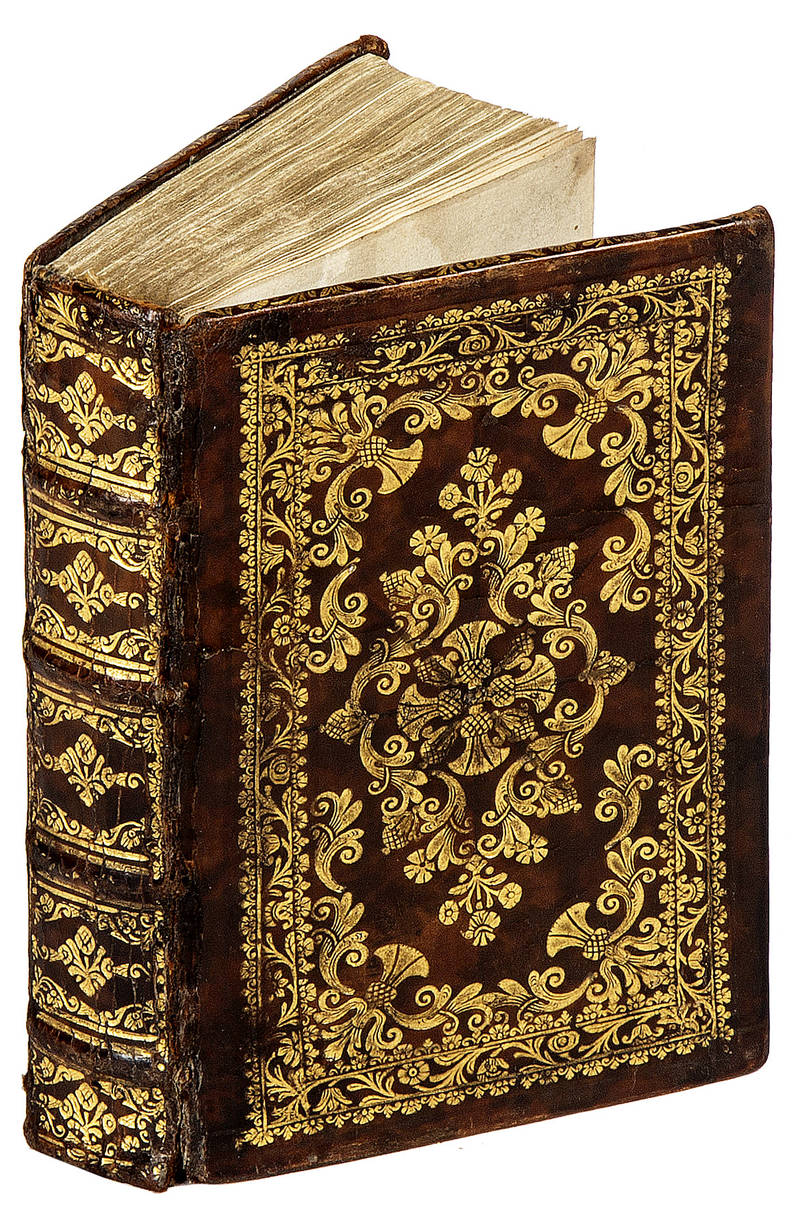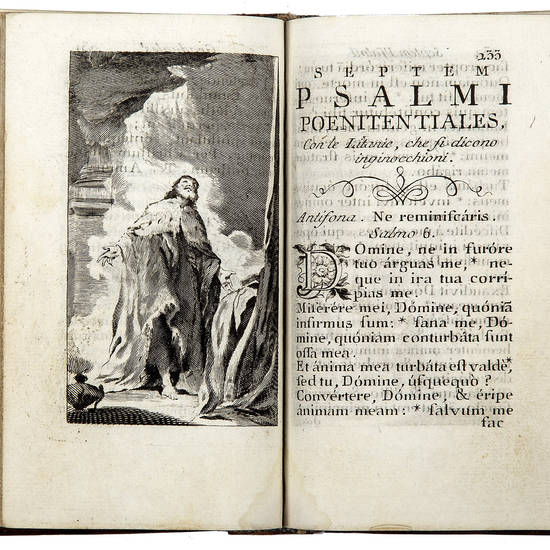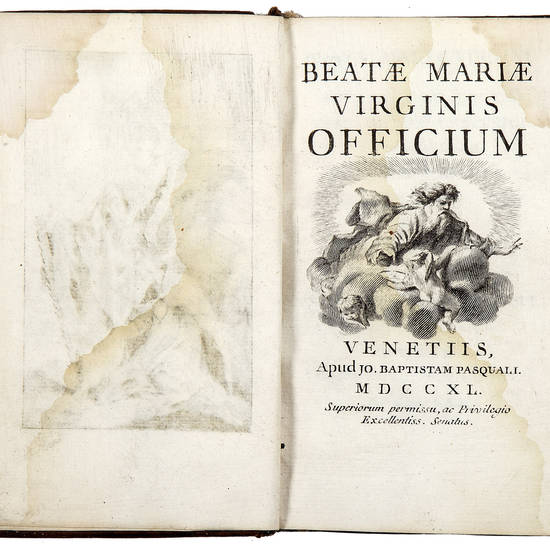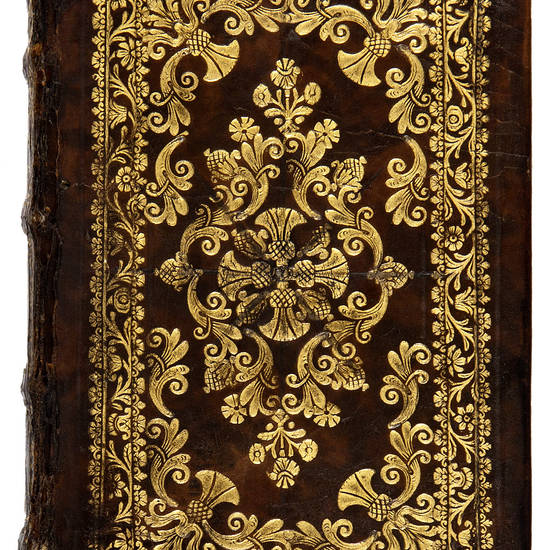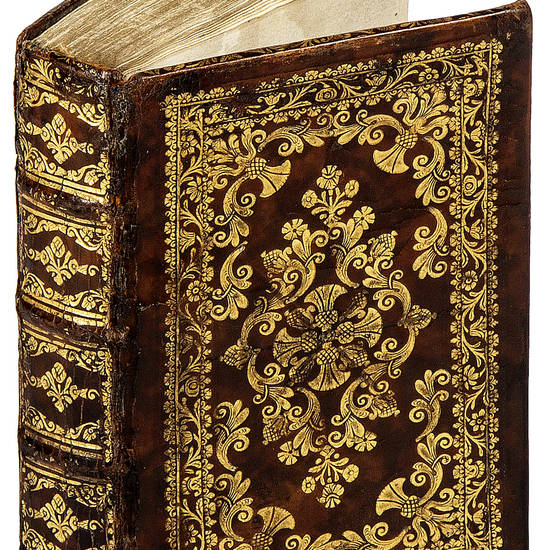“IL GIOIELLO PIÙ GENTILE DEL BIBLIOPOLA PASQUALI” (MORAZZONI)
In 12mo (mm. 131x78). Pp. [40], 427, [5]. Con antiporta, vignetta al titolo, 15 tavole nel testo a piena pagina e 20 finalini incisi in rame da Marco Alvise Pitteri (1702-1786) su disegni di Giovanni Battista Piazzetta (1683-1754). Segnatura: p4 A-Z8 Aa-Ff8. Testo inciso da Angela Baroni. Capilettera xilografici. Lievi aloni marginali, piccolo foro di tarlo al margine esterno di diverse carte che tuttavia rimane ben distante dal testo. Bella legatura coeva in piena pelle, dorso e piatti riccamente ornati in oro, contropiatti rivestiti in seta azzurra, tagli dorati (minime spellature lungo le cerniere). Ex-libris a stampa: “1678 Guido Ringler”. Ottima copia ben rilegata e conservata in astuccio moderno in piena pelle con titolo in oro su tassello e impressioni a secco e in oro al dorso.
EDIZIONE ORIGINALE di uno dei migliori esempi della sensibilità illustrativa del Piazzetta e di uno dei più pregevoli figurati veneziani del Settecento.
“Il gioiello più gentile del bibliopola Pasquali è l'Officium Beatae Mariae Virgins stampato nel 1740 per incarico del ricco negoziante Caime che il libretto ha fatto imprimere in segno di devota gratitudine verso la Regina Celeste alla quale di tanti benefici si confessa debitore. Il libretto è prezioso sotto ogni aspetto, essendo il risultato dell'armonica collaborazione di Giovanni Battista Piazzetta e di Marco Pitteri, due artisti che in quel momento sono i più perfetti rappresentanti della pittura e dell'incisione veneziana. Ben trentasette sono i disegni di G.B. Piazzetta inclusi nelle pagine che Angela Baroni labore improbo, precisa e ammirevole, scolpì ad una ad una. Come sempre il vivace pittore è prodigo di audaci scorci, di ardite luminosità e di quella sensibilità psicologica che fa di lui il pittore più religioso di Venezia, come appare evidente dalle tavole della Cena degli Apostoli e di Re David. Marco Pitteri con questa traduzione fedele ed amorosa di originali tanto difficili da interpretare, inizia quella felice collaborazione con il Piazzetta che solo la morte poteva spezzare quattordici anni più tardi. La forma e il pensiero del pittore nel rievocare gli episodi della vita della Madre di Dio sono fedelmente interpretati; la delicatezza di taglio giustifica in pieno l'accuratissima diligentia lodata dall'editore… La raccolta dei rami dell'Officium Beatae Mariae Virgins deve in seguito essere passata in possesso di Giuseppe Remondini, e il graziosissimo libretto ebbe una larghissima diffusione grazie l'accorta intraprendenza del valoroso bassanese che nel catalogo edito nel 1761, lo ricorda per ben sei volte, in edizioni in 16 e in 32 […]” (G. Morazzoni, Il libro illustrato veneziano del Settecento, Milano, 1943, pp. 115-116).
Catalogo unico, IT\ICCU\PUVE\008510; Morazzoni, op. cit., p. 215; T. Gasparrini Leporace, Il libro illustrato nel Settecento a Venezia, Venezia-Milano, 1955, nr. 56.
[7300]

